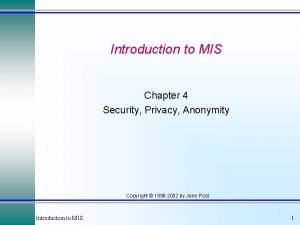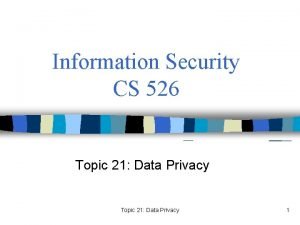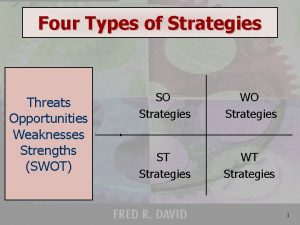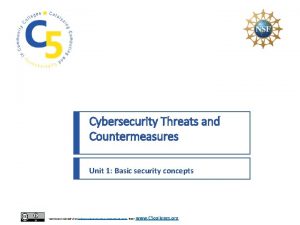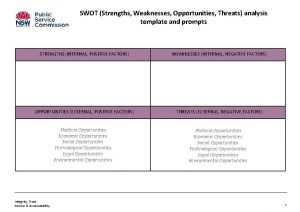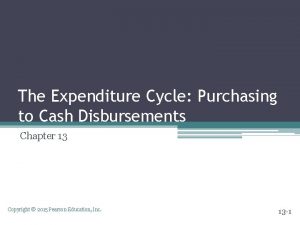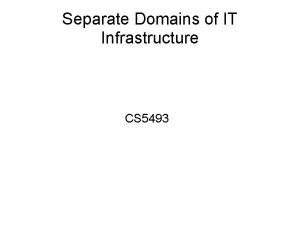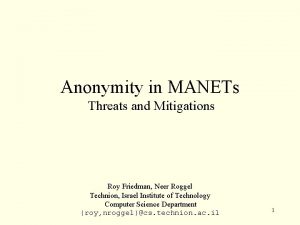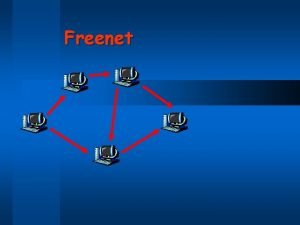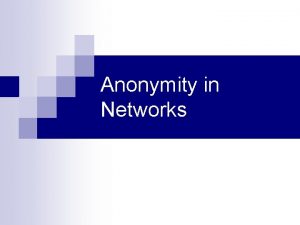Anonymity in MANETs Threats and Mitigations Roy Friedman
















![IP Hopping • Step 3: use temporary addresses [Ai, B, M, D, Ei] A IP Hopping • Step 3: use temporary addresses [Ai, B, M, D, Ei] A](https://slidetodoc.com/presentation_image_h2/e719d746f76886a54c289a6ad2722376/image-17.jpg)




- Slides: 21

Anonymity in MANETs Threats and Mitigations Roy Friedman, Neer Roggel Technion, Israel Institute of Technology Computer Science Department {roy, nroggel}@cs. technion. ac. il 1

Outline • • • What are MANETs? Anonymity scenarios Attackers and threats Our approach: IP hopping Limitations and future work Open discussion 2

What is a MANET? 3

4

5

What are MANETs? 6

What are MANETs? 7

Anonymity Scenarios • Battlefield – Units in motion – Sensor network • Content sharing – Oppressive regime – Rights protected content 8

Attacker Capabilities • • Eavesdropping Geolocating a node Device fingerprinting Generating traffic Man in the middle Node compromise Worm holes 9

Threats to Anonymity • • • Irrefutably implicating a node Distorting route construction “Chattering laptops” Attacks on timing Traffic analysis 10

Traffic Analysis 11

Traffic Analysis Example K IP 8 P A IP 1 B IP 2 L IP 7 O A B M D E IP 6 L O IP 3 D E IP 4 IP 5 K P 12

Our Approach 13

Simple Example IP 8 A L M B P O IP 1 IP 2 K IP 7 IP 3 D E IP 6 IP 4 IP 5 14

IP Hopping • Step 1: agree on shared information A B M D E E D M B A 15

IP Hopping • Step 2: derive temporary addresses 16
![IP Hopping Step 3 use temporary addresses Ai B M D Ei A IP Hopping • Step 3: use temporary addresses [Ai, B, M, D, Ei] A](https://slidetodoc.com/presentation_image_h2/e719d746f76886a54c289a6ad2722376/image-17.jpg)
IP Hopping • Step 3: use temporary addresses [Ai, B, M, D, Ei] A [Ai, B, M, D, Ei] B [Ai, B, M, D, Ei] M D E 17

Traffic Analysis Revisited K IP 8 IP 1 IP 2 L IP 7 A B M D E IP 6 O IP 3 IP 4 IP 5 P 18

Limitations • Routing efficiency – Discovery, maintenance • In-band agreement • Network services – Authentication, service discovery, address binding, address assignment 19

Future Research Directions • More IP information leaks • Better routing mechanisms • TCP stream information leaks 20

Discussion • How can we tell the network to help us find someone we are looking for without telling the network who it is we are looking for? • Once the route is known, how do we ensure that all nodes along the way are capable of receiving the packet and forwarding it? 21
 Effrontery definition the crucible
Effrontery definition the crucible Blender torrent
Blender torrent K anonymity
K anonymity L diversity
L diversity Stanley mark rifkin
Stanley mark rifkin K anonymity
K anonymity Anonymous adjective
Anonymous adjective Freeman vs friedman
Freeman vs friedman Wireless security threats and vulnerabilities
Wireless security threats and vulnerabilities Swotwo
Swotwo Cyber security threats and countermeasures
Cyber security threats and countermeasures Malicious attacks threats and vulnerabilities
Malicious attacks threats and vulnerabilities Factbranch
Factbranch Opportunities and threats of a teacher
Opportunities and threats of a teacher Opportunities and threats of a teacher
Opportunities and threats of a teacher Information opportunities
Information opportunities Strengths opportunities threats weaknesses
Strengths opportunities threats weaknesses Virus and related threats
Virus and related threats Expenditure cycle threats and controls
Expenditure cycle threats and controls List of opportunities and threats
List of opportunities and threats Example of opportunities in school
Example of opportunities in school It infrastructure domains
It infrastructure domains




